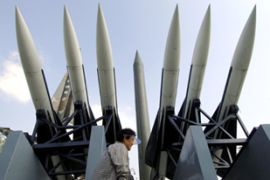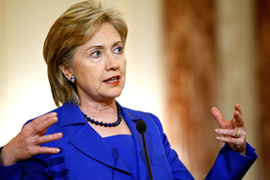US-Seoul alert raised over N Korea
Move comes as North Korea scraps armistice and threatens military strike against South.

The prospect of a naval clash also increased after Pyongyang threatened a military response to any attempt by US-led forces to intercept its vessels off the Korean peninsula’s west coast.
‘Tight defence posture’
| In depth |
|
Videos |
The US has stationed troops in South Korea since the end of the Korean War in 1953 and has about 28,500 soldiers there now.
Won said the raised alert level meant more air surveillance, intelligence analysts and other intelligence-collecting measures would be deployed to watch the North.
This is the fourth time since 1982 that the alert level has been upgraded to stage two, the last being in October 2006 following the North’s first nuclear test.
“We are maintaining a tight defence posture to prevent the North’s military provocations,” added Won. “The military will deal sternly with provocative acts.”
Surveillance is to be focused along the Demilitarised Zone which divides the peninsula, the Joint Security Area at the border truce village in Panmunjom and the disputed sea border in the Yellow Sea known as the Northern Limit Line, he added.
Pyongyang’s latest rhetoric was prompted by Seoul’s decision to join the US-led Proliferation Security Initiative aimed at stopping and inspecting ships suspected of transporting banned weapons, including nuclear technology.
On Wednesday, the US secretary of state reaffirmed Washington’s commitments to allies Japan and South Korea in the face of nuclear and military threats by the North.
US backing
Hillary Clinton told reporters that the US would honour its treaties to defend them.
“I want to underscore the commitments that the United States has and intends always to honour, for the defence of South Korea and Japan,” she said in Washington.
 |
| Hillary Clinton said the door was open for the North to return to nuclear talks [GALLO/GETTY] |
Clinton said there would be consequences for Pyongyang’s act of defiance but said the door to negotiations was still open and that she hoped the North would return to talks on abandoning its nuclear programme.
“We hope that there will be an opportunity for North Korea to come back into a framework of discussions within the six-party talks,” she said.
Under the six-party talks that involve the two Koreas, China, Japan, Russia and the US, North Korea agreed in 2005 to abandon its nuclear programme.
It has subsequently conducted two nuclear tests, one in October 2006 and a stronger one this week.
Key world powers have proposed a range of expanded UN sanctions in response to the latest test as well as measures to give teeth to existing bans and ship searches that have been widely ignored and poorly enforced, Western diplomats said on Wednesday.
UN sanctions
UN Security Council members have agreed in principle to punish the North for exploding a second device in defiance of a UN resolution imposed after its previous test.
Possible steps include a ban on importing and exporting all arms and not just heavy weapons, asset freezes and travel bans for North Korean officials and placing more firms on a UN blacklist, said one diplomat.
The diplomats also said that cargo inspections were also possible, although China is reluctant to support that move.
|
“It’s a matter of time when a fuse for war is triggered” North Korea’s KCNA news agency report |
South Korea’s financial markets, which had fallen in the wake of news of the nuclear test on Monday, rose early on Thursday although traders said investors were still nervous about what other steps the North might take to raise tensions in the economically powerful region.
North Korea has kept up its steady string of strident rhetoric, saying in its official media that “a minor accidental clash could lead to nuclear war”.
“As circumstances show, provocations of war on the part of the US and South Korea have well gone beyond the risky level,” the North’s official Korean Central news agency quoted a state newspaper commentary as saying.
“It’s a matter of time when a fuse for war is triggered.”

